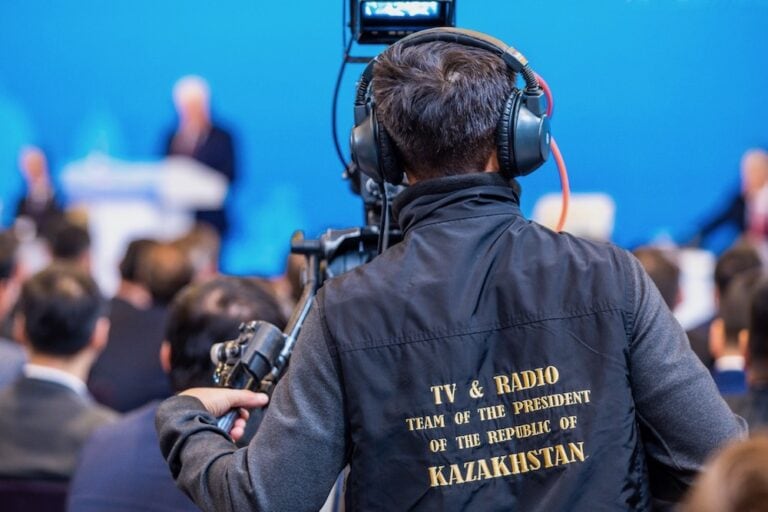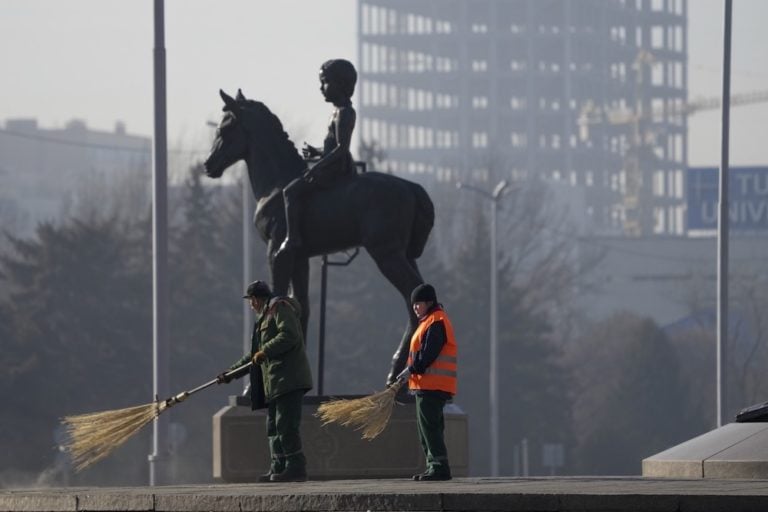(Adil Soz/IFEX) – Adil Soz has sent letters to the Prosecutor General’s Office and the South Kazakh regional prosecutor, expressing its concern that Grigoriy Melnikov, a staff reporter for “Vremya” newspaper, is being persecuted by law enforcement agencies for his criticism of them. In the September 2004 edition of “Vremya”, Melnikov published an article entitled, […]
(Adil Soz/IFEX) – Adil Soz has sent letters to the Prosecutor General’s Office and the South Kazakh regional prosecutor, expressing its concern that Grigoriy Melnikov, a staff reporter for “Vremya” newspaper, is being persecuted by law enforcement agencies for his criticism of them.
In the September 2004 edition of “Vremya”, Melnikov published an article entitled, “Police scuffle”, about drunken partying at a café. The article focused on an individual named Toksanbayev, a colonel in the police force and head of the police’s regional internal affairs department. Police officers who witnessed events at the café reported the incident to the Internal Security Administration. Colonel Toksanbayev was fired based on findings of the administration’s investigation. This information was published in Melnikov’s article. Toksanbayev subsequently filed a lawsuit, based on protection of his honour and dignity, against Melnikov and the “Vremya” editorial board, demanding that they pay him compensation for damages equal to two million tenge (approx. US$15,000).
Another court case concerning Melnikov was initiated in March. Melnikov accused Berik Bilyalov, head of the police’s criminal investigations unit in the North Kazakh region, of “deliberately provoking” him. The journalist had evidence, including dictaphone recordings, to prove that Bilyalov paid a police spy to provoke the journalist to fight with him. According to Melnikov, the spy confessed that Bilyalov wanted a fight to take place in order to file a charge of “hooliganism” and imprison the journalist.
Melnikov believes this provocation was in retaliation for an article he wrote, entitled, “Your life costs $200”, which criticised Bilyalov’s activities.
On 16 March, criminal charges were brought against Bilyalov based on “abuse of authority” and “launching legal action against a person known to be innocent”. In September, the case was closed because the police spy known as “M”, who helped Bilyalov carry out his plan and was a key witness for the defence, went into hiding. Evidence presented by Melnikov, including a video tape of Bilyalov giving instructions to the spy and saying how much the spy would be paid, seemed to be insufficient for investigators to take the case to trial. Melnikov was not given an opportunity to become acquainted with the case documents, allegedly because they were secret, even though he was officially recognised as the victim. In addition, no one informed Melnikov about the results of the investigation conducted in the Bilyalov case.
Meanwhile, Bilyalov launched several lawsuits against Melnikov in the Petropavl city court. He apparently intends to keep fighting until the journalist apologises and pays one million tenge (approx. US$7,500) in compensation. The court accepted Bilyalov’s case against Melnikov for consideration.
In its letters to the Prosecutor General’s Office and the South Kazakh regional prosecutor, Adil Soz said it wanted to ascertain whether the investigations and court decisions on cases involving individuals who have launched legal action against Melnikov complied with the law.
Adil Soz calls upon individuals and organisations who support democracy in Kazakhstan to condemn the persecution Melnikov is facing as a result of his work. These types of actions could cause journalists to stop writing about controversial issues.


